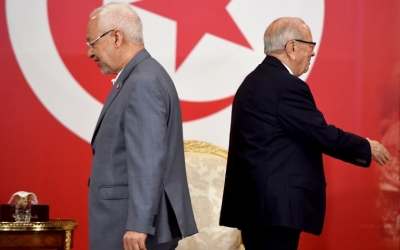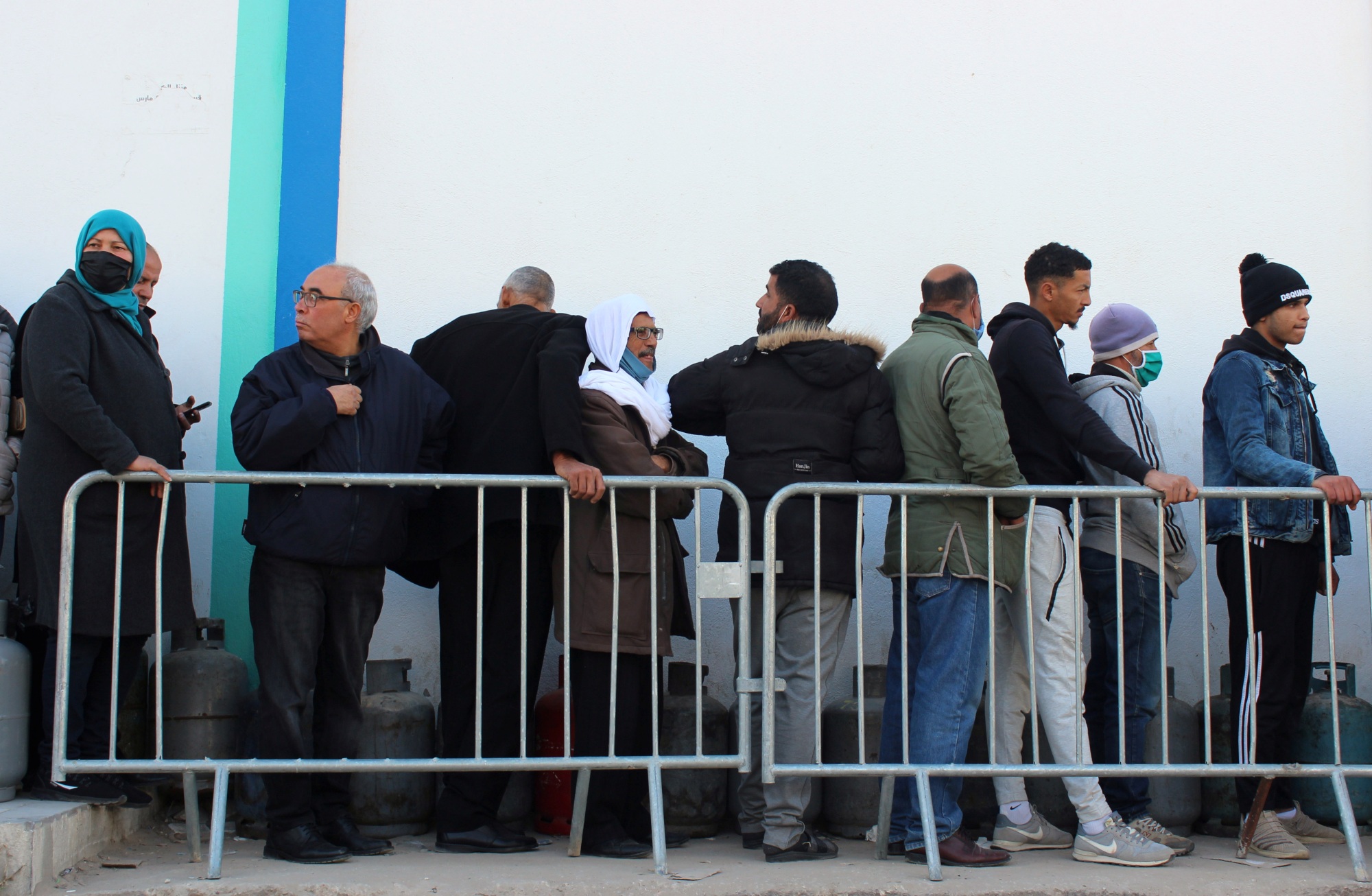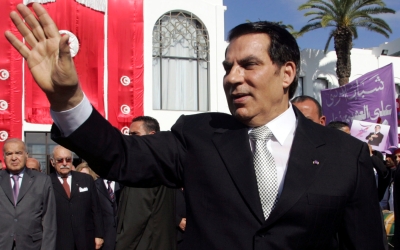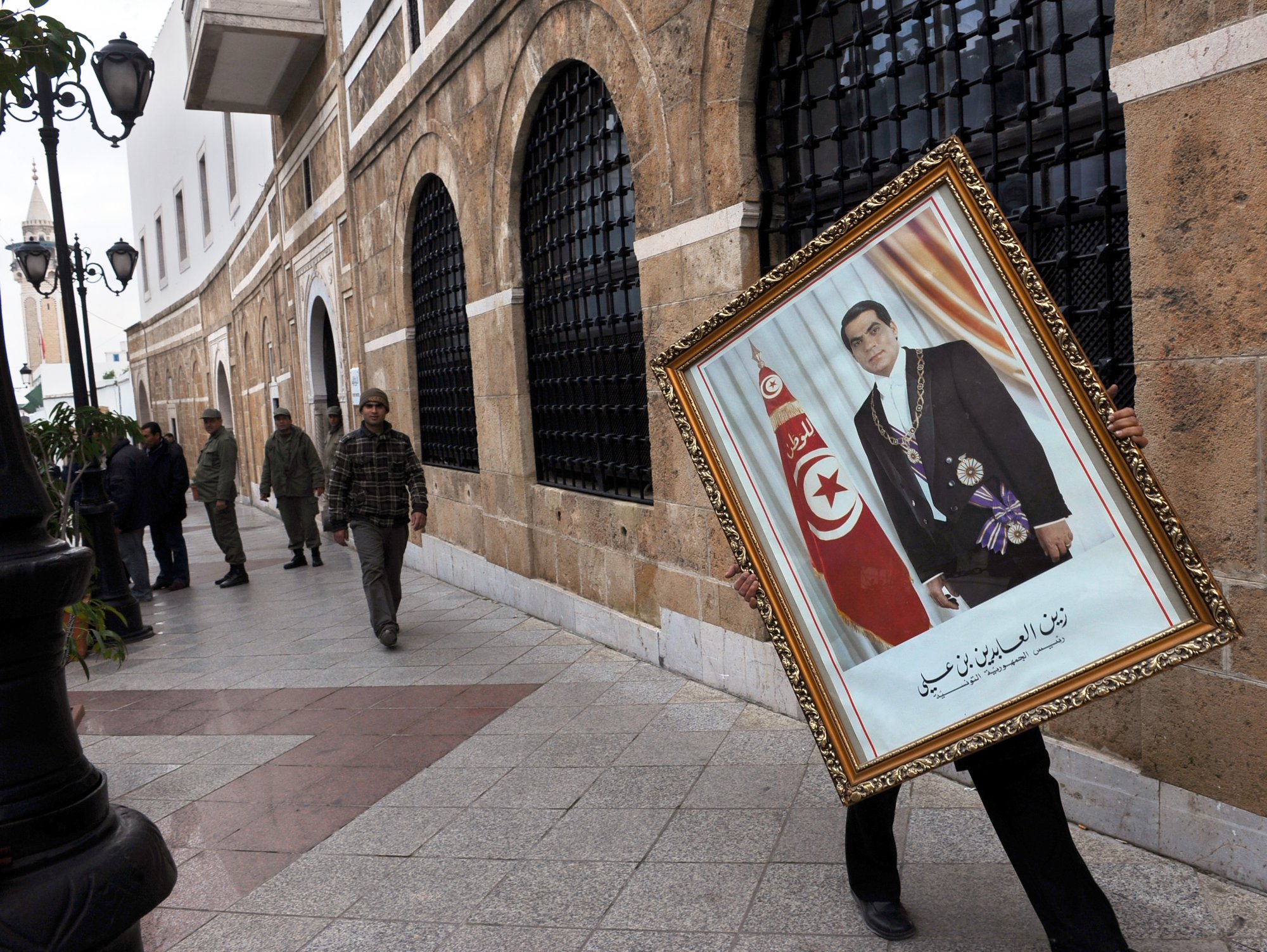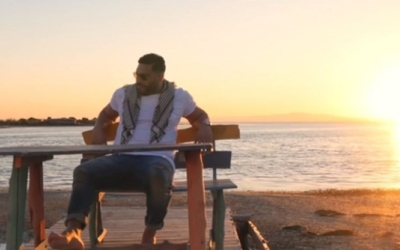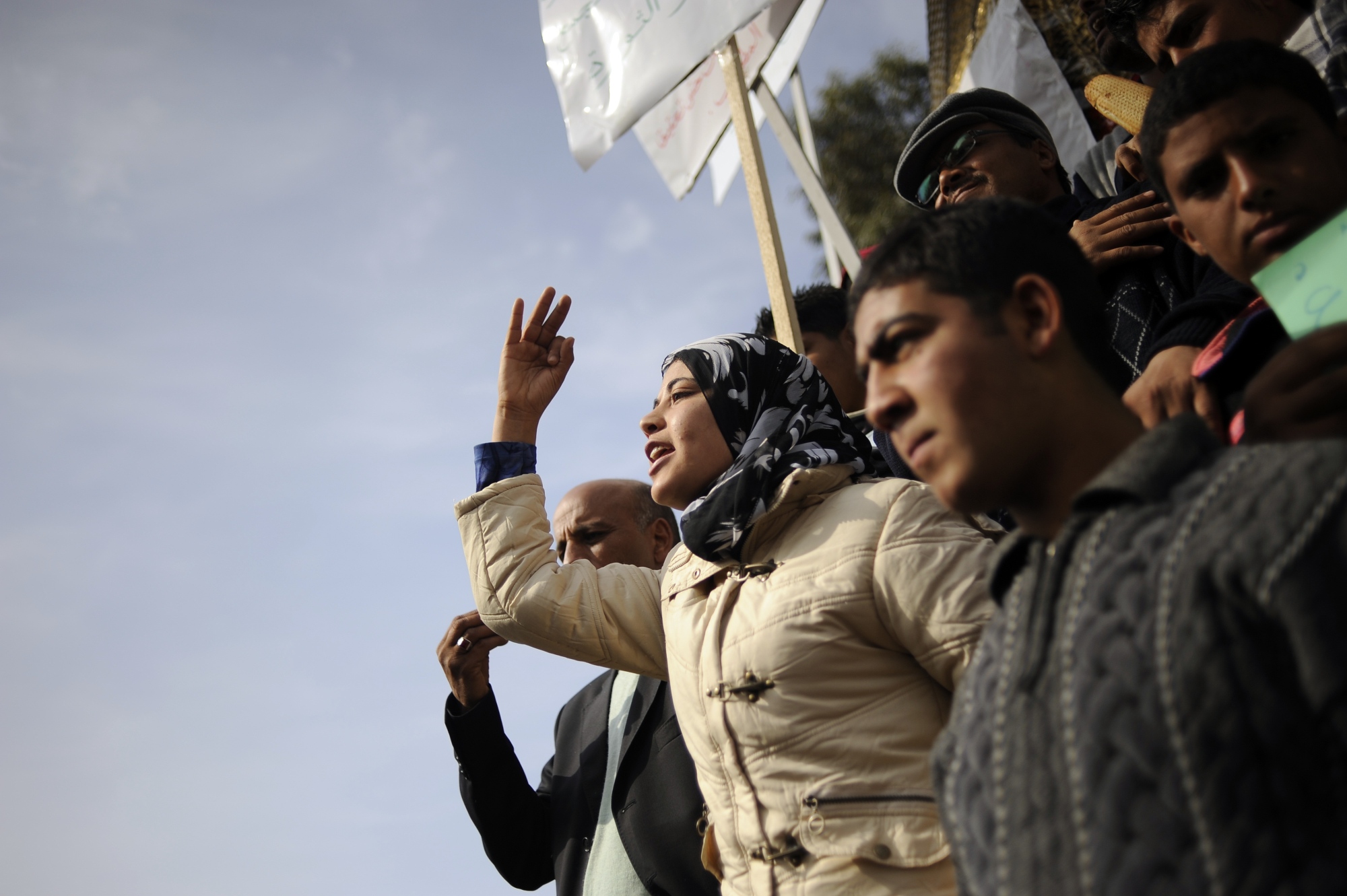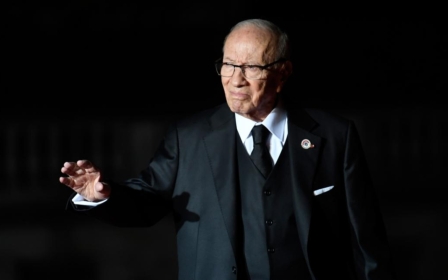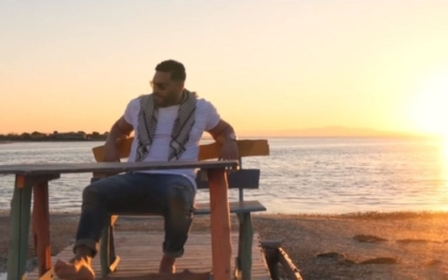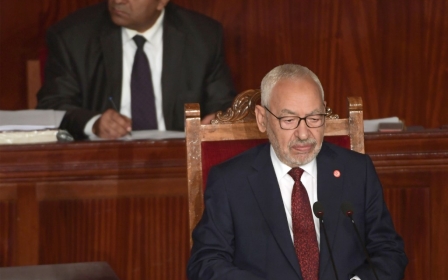Arab Spring: Ten years on, has Tunisia's uprising delivered on its promises?
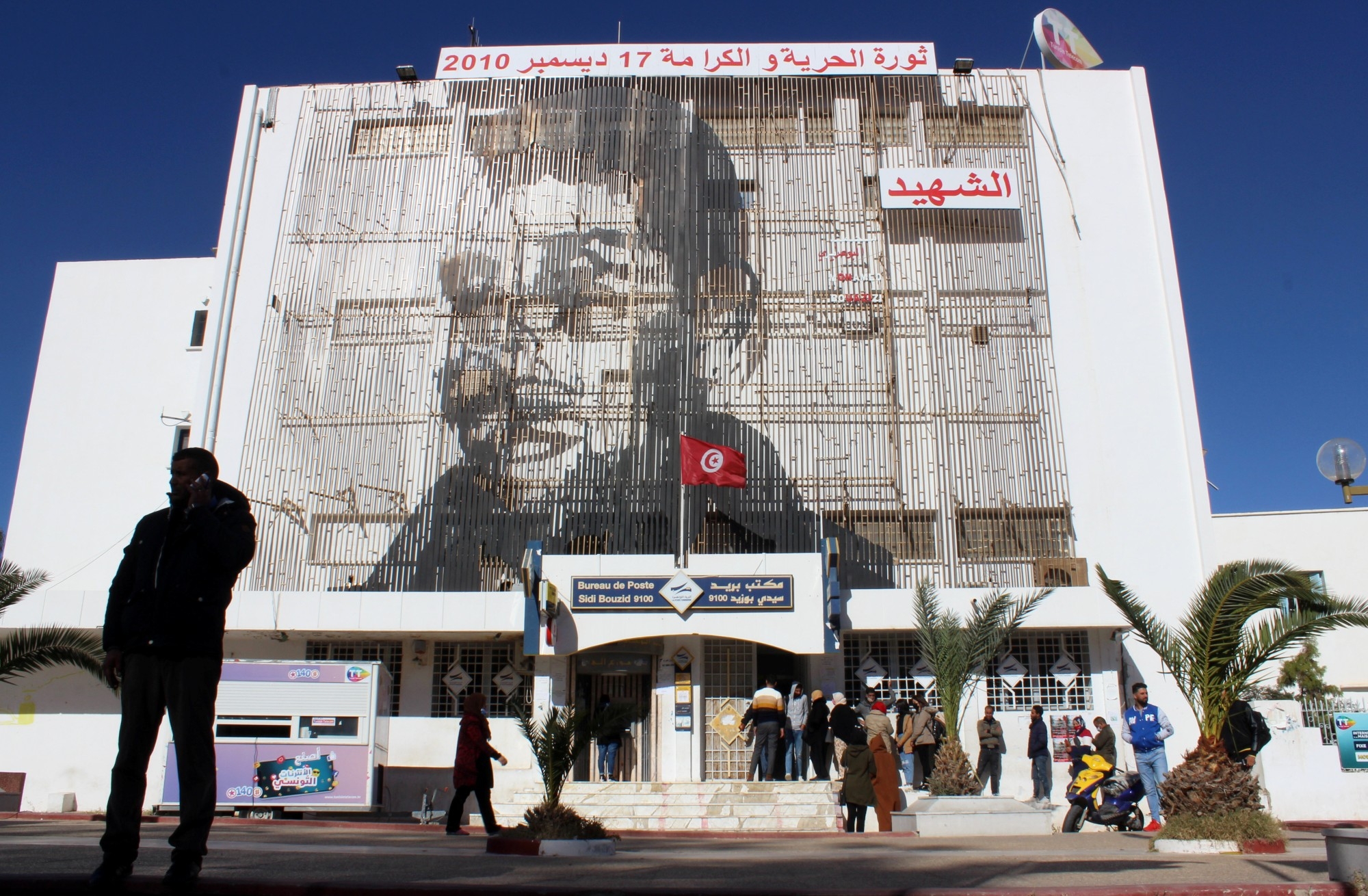
On 17 December 2010, Mohamed Bouazizi, a 26-year-old street vendor from the central Tunisian town of Sidi Bouzid, set himself on fire in protest against the corruption of his local police force, which regularly humiliated him and confiscated his wares.
The act of defiance, which cost Bouazizi his life, became the catalyst for an uprising that took down President Zine El Abidine Ben Ali after 23 years of repressive rule, and spread across North Africa and the Middle East in what would become known as the “Arab Spring”.
New MEE newsletter: Jerusalem Dispatch
Sign up to get the latest insights and analysis on Israel-Palestine, alongside Turkey Unpacked and other MEE newsletters
As Tunisia marks a decade since the historic popular movement, the anniversary is bittersweet for many Tunisians who say little has changed. Despite elections, successive governments and a slew of political promises, many denounce the country’s political elite.
Wahid Benchahla, 37, is an artist who created the “Tunisian Association of Young Artists” with a group of friends.
“Judging what we have experienced during the last ten years, it is obvious that the country’s political class has significantly proved it does not really care about the population’s interests and isn't qualified to do the job,” he tells Middle East Eye. “It is very disappointing and frustrating.”
Like many of his peers in the post-revolution era, corruption - which was already widespread under Ben Ali - is a phenomenon he faces regularly, whether in his daily life or in administrative procedures.
“Things that are usually very simple to have or do, like obtaining a document at the municipality, feel like climbing a mountain because of the bribery phenomenon,” he says.
Benchahla is even categorical on this point: “Corruption is worse than before the revolution.”
Amid high unemployment, mounting debt, unfulfilled reforms and the looming threat of the pandemic, some Tunisians tell MEE of their disillusionment.
At an impasse
A decade later, many in the country see the events that started on 17 December 2010 as an unfinished revolution, with the country’s growing democracy inching along over the years but now stuck at an impasse, Nadia Mesghouni, a Tunisian geopolitical analyst, tells MEE.
“After ten years, we still can’t see our way out considering how things have been managed and dealt with by the different governments we have seen, and it doesn’t look like the situation is going to improve soon,” she says.
The Tunisian Forum for Economic and Social Rights (FTDES) has recorded 6,500 protests in the country since the beginning of 2020, motivated by economic, social and environmental demands.
The civil society movement, which was created in 2011, also estimates that 12,500 Tunisians crossed the Mediterranean Sea into Italy while another 10,000 were intercepted attempting to cross, since the beginning of the year, seeking better opportunities in Europe despite the risks.
During the last few months alone, the country has seen several movements of social unrest erupting across different regions, mainly triggered by unemployment, a struggling economy, rampant inflation and growing public debt.
Public anger comes amid a significant wave of undocumented migration from Tunisia to Italy, explained in large part by the worsening economic, social and political crisis in the country.
“We face the impatience of people who have demands, while the government has no programme to deal with a broken down and unproductive economy, with a social and political climate that is dominated by partisan interests and fraudulent consensus,” FTDES said in a statement.
“It is evident in the broadening of the number of people claiming their rights and the diversity of their forms of protest.”
FTDES explains that the ongoing crisis affects every category within Tunisian society, whether fresh graduates, doctorate holders, public health agents, young doctors, curators, engineers, journalists, judges, sailors or farmers.
Crippling corruption
Amid Tunisia’s transition to democracy, corruption has been a destabilising force in the North African country, infecting all levels of its security, economy and political system.
“I’ve seen and experienced many situations where bribery was a must, whether directly or indirectly,” Benchahla tells MEE. One example he cites is the day he wanted to install an internet line at his home in downtown Tunis.
“I went to the public phone company to purchase an internet line, which the company says it would take them two weeks to come and install,” he recalls. “One of the technicians told me that if I gave him some cash, he would come and install it the next day.”
The latest major case, revealed by a local news channel in early November, is that of the import of waste from Italy by a Tunisian company. The still-unidentified company imported 282 containers of waste in Sousse, south of Tunis, including 212 containers of household waste, without authorisation, according to official statements by the Ministry of Environment.
The ministry launched an administrative investigation, as it is believed government officials within the department were involved.
In October, a Swiss consultancy firm published the results of a survey it conducted targeting law firms, banks, industrialists, transcontinental companies, decision-makers and governmental organisations in Tunisia.
Stratege Consulting’s survey shows that 59 percent of those polled say the government doesn’t make enough efforts to reduce corruption.
“Only one in ten Tunisians considers the state’s fight against corruption to be promising, which is an insufficient percentage,” the firm’s executive director, Sami Jalouli, told the press.
In July 2018, the Tunisian parliament approved a law aimed at combating illicit enrichment as part of the country’s efforts to fight against corruption.
A year prior, the government had launched a significant operation arresting twenty businessmen on suspicion of corruption, confiscating their property and freezing their bank accounts.
This was the first time such a major operation was conducted by the authorities to demonstrate their good faith.
In the first year after Ben Ali’s ouster, the transitional government set up an anti-corruption committee, but it lacked the resources to effectively achieve its aims.
Today, more than ever, dealing with such a phenomenon requires youth-led activism and broad and sustained public support, the International Centre for Transitional Justice legal officer Mohamed A Zouari, has argued.
Tunisia was ranked 74 out of 198 countries in the 2019 Corruption Perceptions Index compiled by Transparency International. The organisation attributed the country’s trouble with corruption to the weakness of state institutions and laxity of authorities to end this phenomenon.
Eight governments in 10 years
Since 2011, Tunisia has seen eight successive governments, including two interim ones, with an average lifespan of one year each, due to fragmented politics and a lack of a clear majority. The government of Prime Minister Youssef Chahed was the only exception, lasting for three-and-a-half years between August 2016 and January 2020.
While the North African country may have been the birthplace of a regional movement for change, few reforms have succeeded in getting it on track.
Government instability has contributed to weaken the chain of command within the ministries necessary to implement reforms, says Michael Ayari, a senior analyst at the International Crisis Group for Tunisia and Algeria. International partners, he explains, have complained of the frequent change of interlocutors and today they would seem to prefer stability.
The country’s economy continues to hold up thanks to foreign donations and loans obtained since 2011 – but most economic prospects present grim forecasts for the near and distant future of the country's economy, according to Ayari.
Unlike its neighbours, Tunisia doesn’t hold abundant natural resources. One-third of its principal mineral resource, phosphate, is exported but fails to provide a significant enough source of income.
Prime Minister Hichem Mechichi told Parliament in September that his government’s priorities would be “to restore the normal pattern of oil, gas and phosphate production” to pre-November levels when a protest movement decided to block production over unemployment and the general social and economic situation.
Risk of shocks
Since 2017, the government had failed to resolve its dispute with protesters in southern Tunisia’s El-Kamour, until earlier this month, when it finally signed an agreement with the group’s representatives to put an end to the blockade.
Meanwhile, the clock is ticking for Tunis. Between 2020 and 2021, Tunisia will be required to start reimbursing 123 external loans dating from 2012 to 2016, according to a report released last March by the country’s accounting office authority.
Between 2021 and 2025, the accounting authority said reimbursements would reach around $1bn a year, and that Tunisia could be paying back these loans well into 2055.
Meanwhile, “public debt, the majority external (70 percent), increased by 95 percent between 2010 and 2019, placing Tunisia at risk of serious shocks and reducing liquidity available to the private sector”, the African Development Bank (ADB) warned.
Unemployment is also a point of concern. According to the institution’s data, unemployment among people ages 15 to 24 is 34.3 percent. The poverty rate, which dropped from 20.5 percent in 2010 to 15.2 percent in 2016, later significantly increased due to increased living costs, the ADB reported.
Continuing inequalities, the multilateral development finance institution says, are destabilising the social climate and impeding investment and growth.
Second wave of Covid-19
The global coronavirus pandemic has only made things worse for the recent government that took office on 2 September.
The country’s doctors, interns and residents in medicine launched a large protest movement to alert people to their working conditions amid a second wave of the Covid-19 pandemic that has further strained hospitals struggling to cope with the rise in cases amid a lack of adequate equipment.
The economic effects of the pandemic will put Tunisia in even more dire straits vis-a-vis its debt, the International Monetary Fund (IMF) warned.
“Tunisia’s debt burden will increase significantly as the country grapples with the Covid-19 shock, reflecting the steep fall in growth and the deterioration of the primary fiscal balance as a result of lower revenues and the crisis-response measures,” the international institution wrote, adding that public and external debt were expected to reach 89 and 110 percent of the GDP in 2020 respectively.
“Once the Covid-19 crisis abates,” the IMF added, “the Tunisian government will take measures to improve Tunisia’s fiscal accounts, including through policies to further reduce energy subsidies in a socially conscious way and to contain the civil service wage bill that remains among the highest in the world.”
As uncertainty persists ahead of the celebration of the 10th anniversary, many observers expect an intensification of protest movements ahead of 14 January, the anniversary of Ben Ali’s ouster.
Videographer Malek Abdelrahman was full of hope when he participated in and documented the protests that started in December 2010. Today, he says frustration and disappointment permeate Tunisian society.
“You see it and smell it when you take a walk in the neighbourhoods and markets, as life gets more expensive and living costs increase every year,” he told MEE. “As seen at this time of the year for the last ten years, we’ll have a lot of protests across the country as 14 January approaches.
Middle East Eye delivers independent and unrivalled coverage and analysis of the Middle East, North Africa and beyond. To learn more about republishing this content and the associated fees, please fill out this form. More about MEE can be found here.


